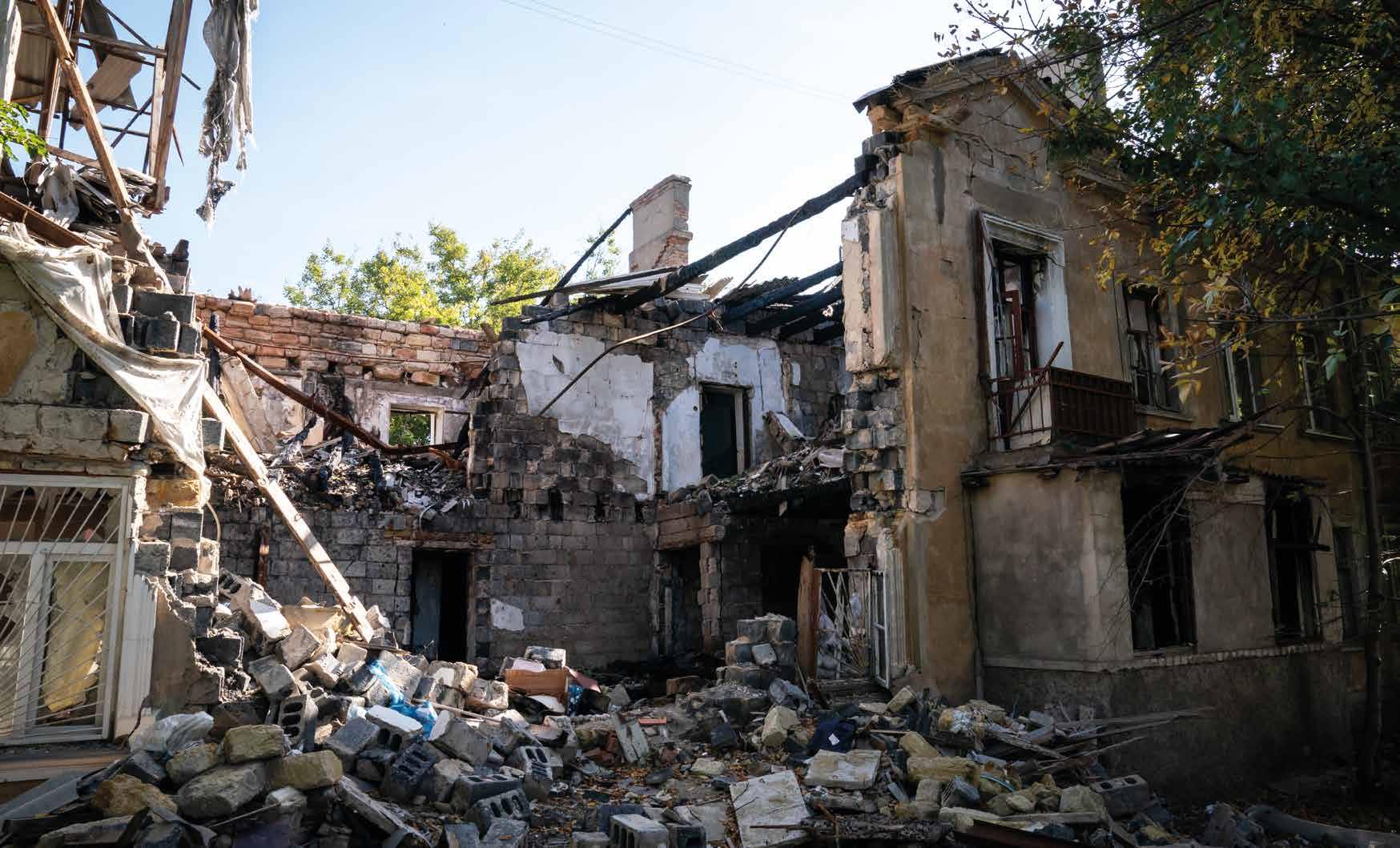
11 minute read
IMPROVING HUMANITARIAN PROGRAMME DELIVERY
Being accountable to communities
All DEC member charities and their partner organisations operate a wide range of feedback mechanisms, including feedback boxes, paper forms, emails, QR codes for online feedback, platforms such as WhatsApp and Telegram, telephone hotlines, and in-person feedback. However, there are some weaknesses that DEC member charities are seeking to address. For example, an assessment carried out by one DEC member charity showed that one in five people did not know how to make a complaint, so the charity is taking steps to raise awareness of feedback mechanisms.
Other DEC member charities have realised that an overreliance on digital ways of sharing information and seeking feedback can exclude some groups, such as older people.
information exchange between affected populations and staff. The mediators consult directly with affected people on issues such as access to educational services and medical care. They then identify appropriate actions and share the solutions with other refugees who have not been involved directly. Another member charity responding in Poland developed a poster, in direct consultation with a group of children, on children’s rights and ways to report abuse and misconduct. The member charity ensures that all implementing partners commit to discussing the content of the poster during all group and individual activities.
raise awareness, promote acceptance and reduce stigma as a key part of delivering support.
As the conflict continues, with no end in sight and with so many people from host communities facing their own struggles with the cost of living crisis, there is a growing risk of tensions between refugees and displaced people and the communities hosting them. Many DEC-funded programmes are developing initiatives aimed at boosting social cohesion and ensuring that the needs of vulnerable people in host communities are addressed alongside those of Ukrainian refugees and displaced people.
Despite the efforts of governments, local authorities and humanitarian responders, the need for humanitarian assistance remains vast. The amount of funding overall is not enough to reach everybody who is in need of assistance. For example, when a DEC partner organisation in Ukraine launched an online application form for family cash assistance on 23 February 2023, they received over 17,000 applications in less than 24 hours. For some DEC member charities, the majority of concerns raised through their feedback mechanisms are from people who were not selected for assistance because they did not meet the vulnerability criteria.
Identifying people most in need of support and registering them for assistance – especially when people are constantly on the move, or living in temporary and insecure situations remains a challenge for humanitarian responders. A key focus for DEC member charities is ensuring accountability, alongside the flexibility to adapt to rapidly changing circumstances in planning and delivering their programmes.
A survey conducted for a DEC member charity found that more than 80% of people preferred talking to staff directly on both sensitive and non-sensitive topics over other channels of conveying feedback. One member charity therefore relies on a network of volunteers, including those from the refugee population, to talk to and obtain feedback from affected people. The member charity also ensures that its projects recruit staff and volunteers who can speak Ukrainian, Russian or Romani, the most widely spoken languages in Ukraine.
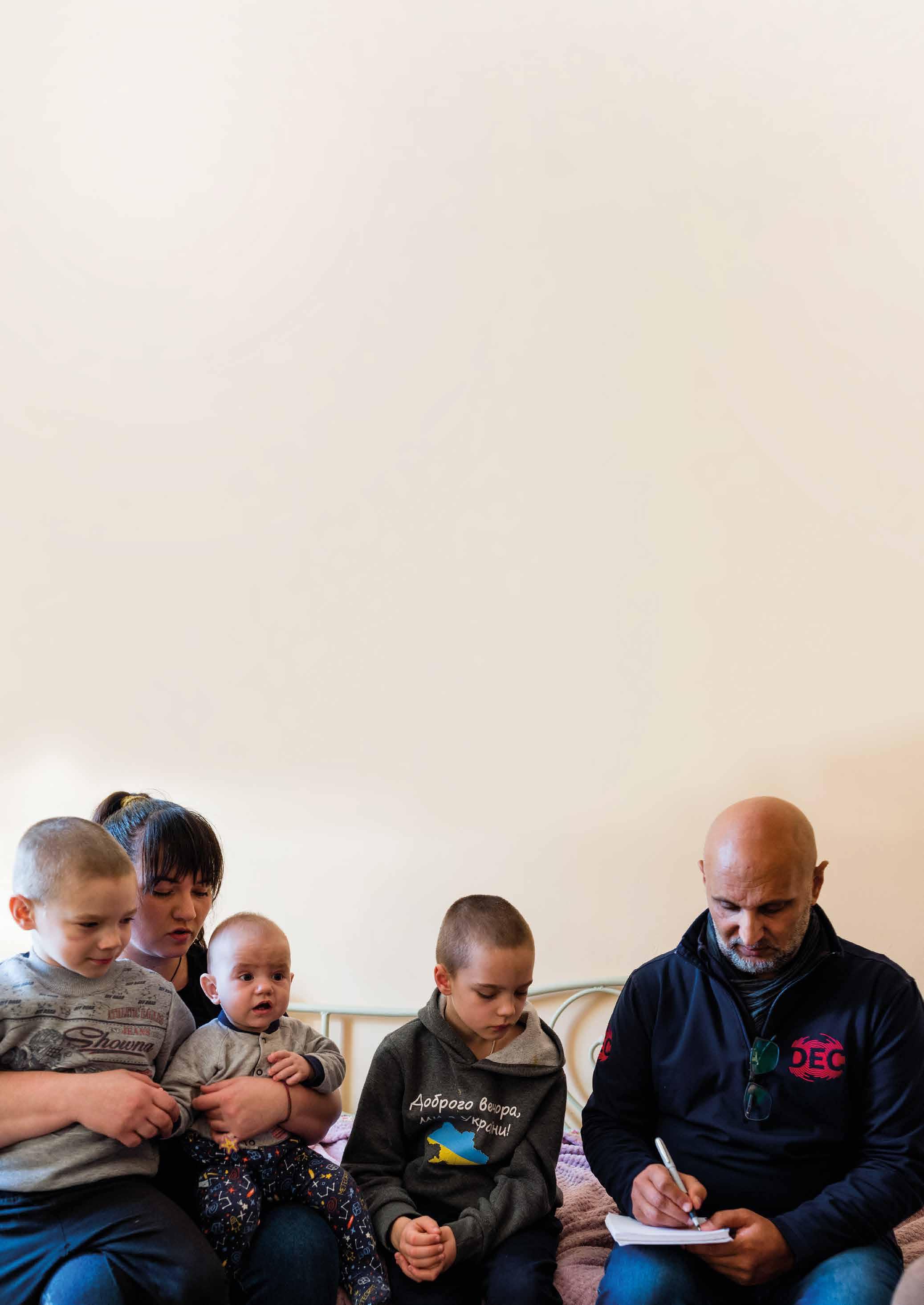
A people-centred approach is critical to build trust with affected people and to assess their multiple and differentiated needs. One member charity responding in Romania employs cultural mediators to ensure effective translation and two-way
Alongside these initiatives, digital and online channels remain a critical part of feedback and information-sharing systems, due to the high numbers of people being supported by the humanitarian response. An ‘Infoline’ set up in Poland by one DEC member charity responded to nearly 36,000 calls and 878 chatbot messages from September 2022 to February 2023. In Ukraine, a hotline established by the partner organisation of two DEC member charities was immediately inundated with thousands of requests for assistance and received complaints from those unable to get through. In response, the partner organisation provided the option for people to request a call-back from a hotline operator and where appropriate, the option of booking an appointment to receive advice in person. However, the partner organisation estimates that it is only able to meet around 1 in 15 requests for assistance received via the hotline, highlighting the scale of the demand for humanitarian support.
Including people with specific needs
Refugee centres and aid distribution points have been planned with the needs of a wide range of users in mind. This includes appropriate lighting, separate toilets and showers for men and women, accessible facilities for older people and people with disabilities, partitions to create private spaces for families, child-friendly and childcare spaces, and communal meeting areas. Assistance is customised to meet specific needs: for example, one member charity in Ukraine created travel kits for refugees in transit based on age, gender and specific needs (for example, providing personal hygiene products for women, such as underwear and sanitary pads) and depending on their travel plans (such as short travel or long travel). Member charities have also adapted distributions according to identified needs: for example, one member charity in Moldova planned to distribute food baskets, family hygiene kits, baby food kits and baby hygiene kits, but revised their distribution plan to include an additional type of kit specifically developed for the needs of older people aged 60 and over.
DEC member charities work in partnership with local organisations which have strong connections with and are known and trusted by the communities they serve. For example, one member charity responding in Ukraine partners with organisations, one of whom works with LGBTQIA+ communities and the other works with sex workers and one that works with people living with HIV. This means the DEC-funded humanitarian response can reach these often marginalised and overlooked groups, including gathering regular input about their particular needs. During the reporting period, the same DEC member charity expanded its support to young people through a partnership with a youth-led organisation that works with young people across Ukraine. The partnership provides training and support for young people with a focus on marginalised groups such as LGBTQIA+ individuals – with the aim of promoting integration for young internally displaced people in host communities.
Another DEC member charity has developed a specific project for internally displaced people in Ukraine providing family-based foster care. With DEC funding, this project enables households to receive a wider and more comprehensive range of assistance and services, including meeting gender-specific needs, such as the addition of separate rooms for girls and boys, and delivering a 50% increase in the number of community social workers supporting people in target communities.
Supporting a locally-led response
Localisation is a key principle of DEC-funded humanitarian responses, and thanks to the generosity of the UK public’s support for the Ukraine Humanitarian Appeal, the DEC has been able to provide local partner organisations with funding for project delivery and to cover some of their core operational costs. As the conflict in Ukraine extends into its second year, this core funding provides local partner organisations with the financial security to build their capacity and expertise, and to plan for delivering long-term support to people in need. For example, one partner organisation in Ukraine receives funding from two DEC member agencies, both of which earmark half their contribution to meet their partner’s support costs, meaning that the partner can allocate budget for local staff care, training and capacity strengthening.
Another DEC member charity in Ukraine has made a series of support visits to partner organisations to discuss the partnership and develop tailor-made capacity strengthening approaches involving training courses, online and face-to-face sessions, accompaniment and mentoring. Capacity strengthening is a two-way process between DEC member charities and their partners, where both parties acknowledge, and support each other to learn from their strengths and weaknesses.
Partner organisations supported by DEC funds often directly involve people in need as participants in delivering the humanitarian response. For example, one partner organisation in Ukraine has recruited internally displaced and homeless people as staff and volunteers. As well as enhancing their opportunities and strengthening local capacities, the programme benefits from drawing upon their personal expertise in displacement and homelessness. In some cases, community participants themselves take over designing and running activities with support from DEC member charities and their partner organisations.
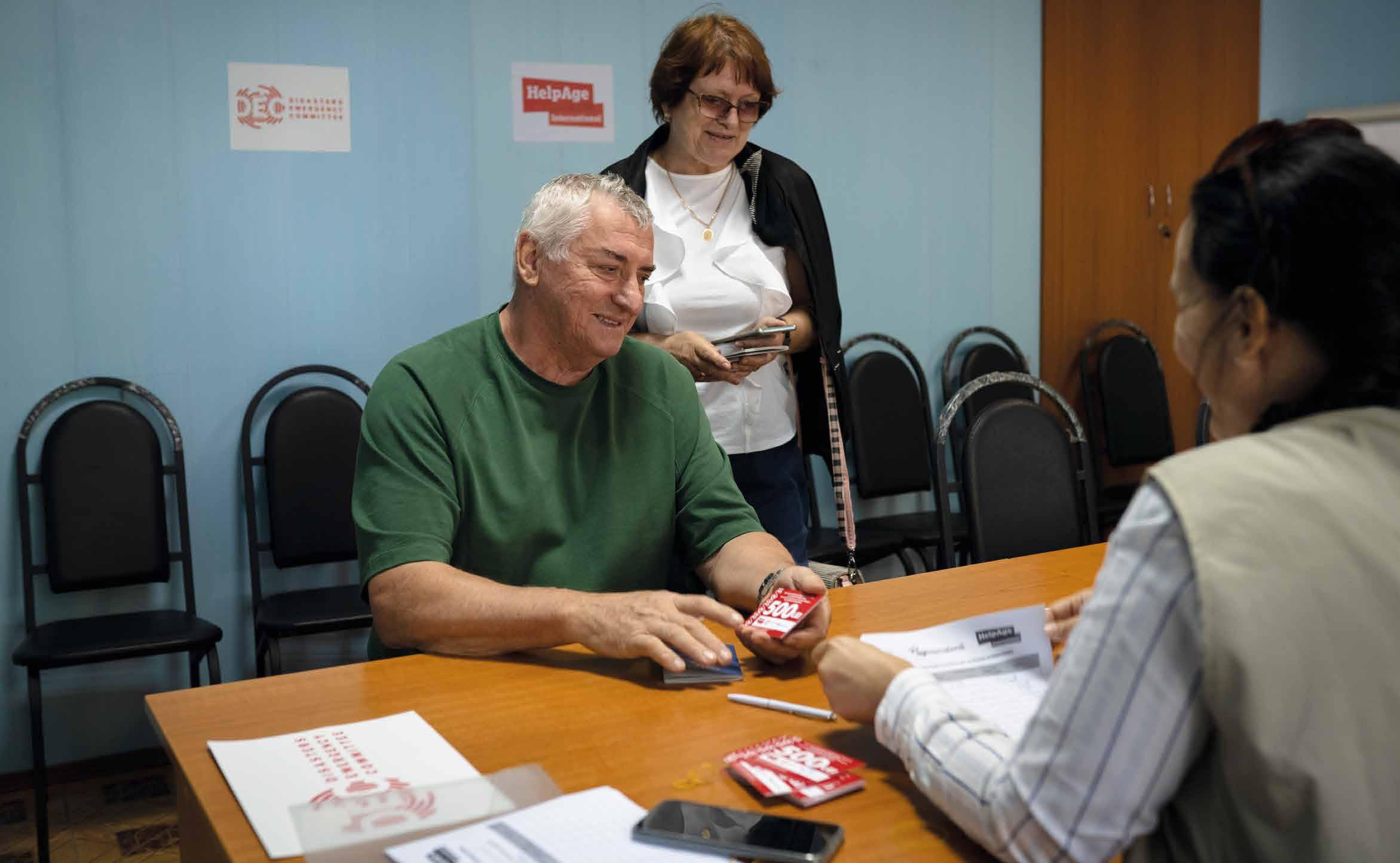

A particular feature of the DEC-funded Ukraine response is the use of group cash grants to enable local groups to develop community-led initiatives based on local priorities. Examples include the development of social cohesion projects to bring together internally displaced people and host community members. One DEC member charity has been supporting a survivor and community-led response, which shifts decision-making power to communities by providing community groups with flexible grants that they can use to address their priority needs. The member charity developed simplified project documentation for grant awardees alongside offering continuous mentoring, a longer time period after implementation to evaluate and reflect, and support to increase the flexibility and inclusivity of community groups. The approach is underpinned by complete transparency on the budget available for initiatives and on selection of initiatives for funding. Through this, the approach aims to enable horizontal accountability, whereby community members can support and hold each other to account throughout the process.
Supporting community-run initiatives
In Ukraine, one DEC member charity identified 23 community-based organisations and initiatives and helped set up a forum to enable them to network and exchange ideas. Outreach teams also supported the community groups with project preparation and design, so that they could submit proposals to a communitybased protection committee. Proposals included social cohesion projects, women and youth empowerment, and financial resilience.
One local initiative supported by this process was a toloka – the Ukrainian name for a project to benefit the community where community members offer their time and efforts for free. Following a community consultation, tolokas were set up to help prepare two schools, which serve children from six villages for the school year. After the toloka, participants shared a feast of homemade food to celebrate completing the task. Not only did the activity improve children’s access to school, it also created a festive atmosphere to bring back memories of joy. As one of the participants noted:
Adapting programmes to meet changing needs
The ability for DEC member charities to adapt to changing needs and contexts is a critical and valued element of DEC funding. Feedback provided by local partners shows that DEC member charities are seen to be very flexible and supportive in working alongside partner organisations to adapt programming to meet new needs and changing circumstances. Examples include a partner organisation in Ukraine which received feedback through its hotline about people’s difficulties in registering for cash assistance due to large numbers of people gathering at registration points. The partner organisation introduced pre-registration lists and timetables for each distribution point for the next planned distribution (of hygiene kits), to help reduce waiting times and overcrowding.
Other member charities have responded to feedback from refugees and input from partner organisations by, for example: introducing kiosks at refugee centres where people can select the type and quantity of hygiene items based on their needs, rather than receiving a standard set of items in a hygiene kit; extending protection services to new locations according to newly identified needs; adding activities to support refugees in finding accommodation; and setting up mobile units to provide services in various locations rather than a limited number of fixed locations as originally planned.
Although DEC member charities had prepared to help people through the freezing winter months in Ukraine, the abrupt increase in attacks on civilian infrastructure from October 2022, particularly of the power grid, meant that work in this area had to be substantially increased to keep people safe and warm. The flexibility of DEC funding meant that DEC member charities and their local partners were able to quickly change their plans to meet these emerging needs by providing more blankets, warm clothes and shoes, providing generators both for households and larger units for collective shelters that could be used to provide warmth and light, and by repairing homes and communal centres to keep them warm. Thankfully the winter was relatively mild this year, but this work was still vital amidst frequent power cuts and heating outages in very cold conditions. “[The DEC] is very flexible and has very flexible conditions and we can redirect money easily,” said the CEO of one local partner.
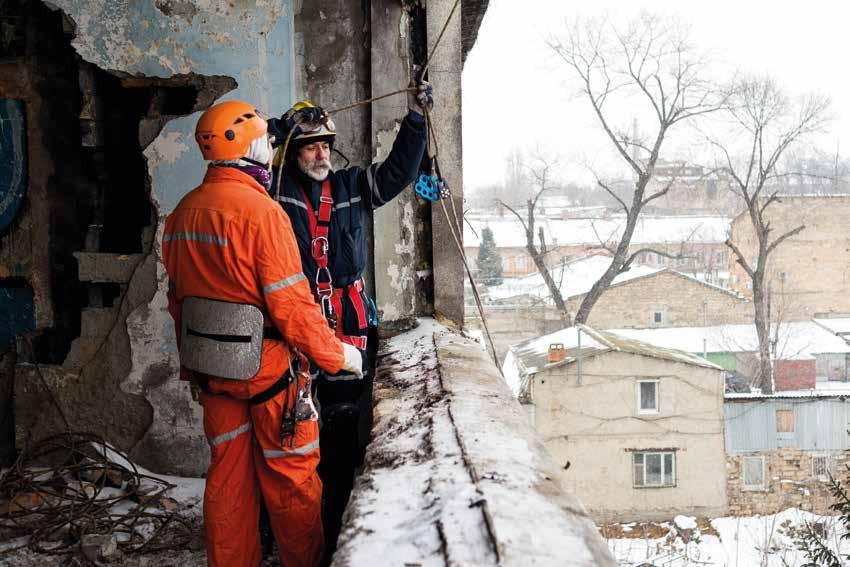
Expanding support to areas of greatest need
During this phase of the DEC’s Ukraine response, the DEC is piloting a new ‘Pipeline’ funding stream for Ukraine, which gives additional funding to DEC member charities which have received a smaller standard allocation of DEC funds (based on the DEC’s funding allocation criteria) but have capacity to respond in areas hosting the largest numbers of internally displaced people (such as Dnipro, Zaporizhzhia and Kharkiv in the eastern oblasts). People in these areas need support with meeting their most basic needs, such as access to food and provision of hot meals, as well as shelter and hygiene support. Partner organisations receiving Pipeline funding through DEC member charities have fed back that the additional funding has enabled them to sustain and expand activities in the areas of greatest need, including, for example, shifting winterisation activities to Kharkiv and Mykolaiv when these areas became accessible.
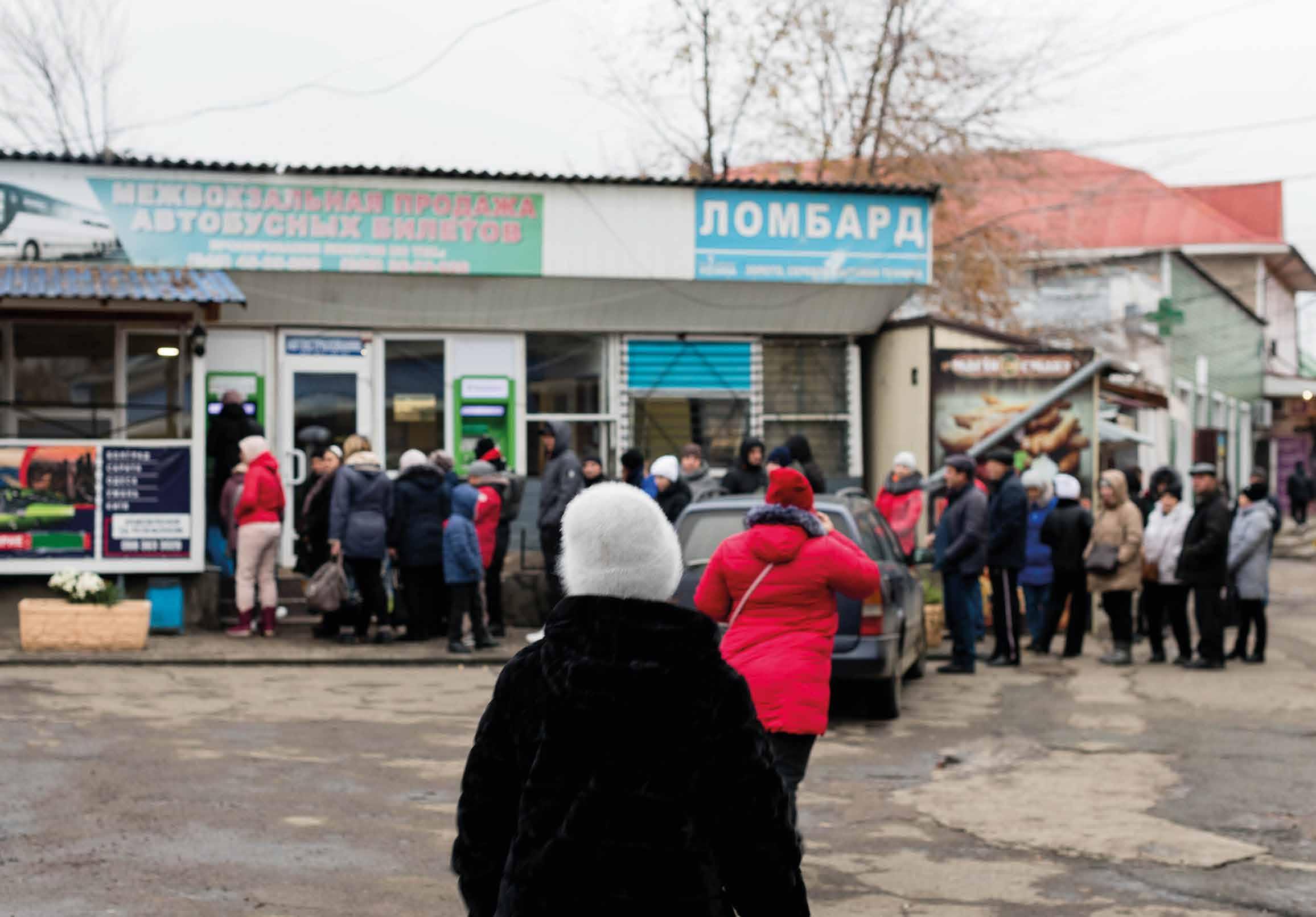
Safeguarding vulnerable people
All DEC member charities ensure that partner organisations prioritise the safety and security of vulnerable people in delivering their humanitarian responses. One DEC member charity noted that some partner organisations were initially of the view that issues of gender-based violence, discrimination, harassment and exploitation ‘do not belong to Europe’. However, through discussions and training with the DEC member charities, they acknowledged the prevalence of these risks and became keen to establish and strengthen their safeguarding mechanisms.
In addition to the DEC-funded Safeguarding Resource and Support Hub for Eastern Europe (see page 39), individual member charities have taken a number of specific initiatives to improve safeguarding, including: providing partner staff and volunteers with training on safeguarding risks and policies; supporting partner organisations to review and create safeguarding policies; carrying out project-level risk assessments to ensure any risks are identified and mitigated against; appointing a designated safeguarding focal person in partner organisations, and strengthening the capacity of these safeguarding focal points; improving visibility of information about codes of behaviour and feedback mechanisms for people receiving aid; embedding questions about safeguarding in post-distribution monitoring; and ensuring onward referral to appropriate support services as required, based on need and with the affected person’s consent.
Supporting staff wellbeing
DEC member charities strive to be sensitive to fatigue, burnout and mental health strain on their staff, partner staff and volunteers. Many DEC members provide dedicated wellbeing support to staff, including recruiting psychologists to provide support to staff and volunteers, and organising stress management and psychological first aid training. One member charity supports the wellbeing of partner staff by providing Community Resiliency Model training, which trains community members who have experienced distress to not only help themselves but also to help others within their wider social network. In Poland, one DEC member charity reallocated a small amount of funding to provide counselling and psychological support to partner staff and volunteers working at a food kitchen, to help them maintain their own wellbeing and also deal with the impact of hearing from refugees about their traumatic experiences.
Protecting the environment
DEC member charities endeavour to reduce the environmental impact of humanitarian delivery as far as possible in the context of an often volatile and pressurised operating context.
This includes, for example, procuring items for food packages and hygiene kits as locally as possible; using biodegradable or recyclable packaging, such as cardboard boxes for food baskets; using green distribution methods where possible, such as cycle couriers to distribute packages to households; consulting with communities to ensure items provided meet their exact needs; and prioritising cash assistance, so people can buy what they need from local suppliers.
One DEC member charity in Ukraine identified the need to provide an alternative energy source for a community centre to cope with regular cuts in the electricity supply. Internally displaced people and members of the host community use the centre for recreational activities, having access to hot drinks and heating, and charging their mobile phones. The member charity reallocated DEC funding to the purchase and installation of a solar panel system at the community centre.
At the household level, DEC-funded repair works endeavour to promote sustainable solutions such as installing insultation and energy-efficient heating. These approaches are not only good for the environment by reducing emissions, but also for residents who benefit from reduced heating and energy bills.










